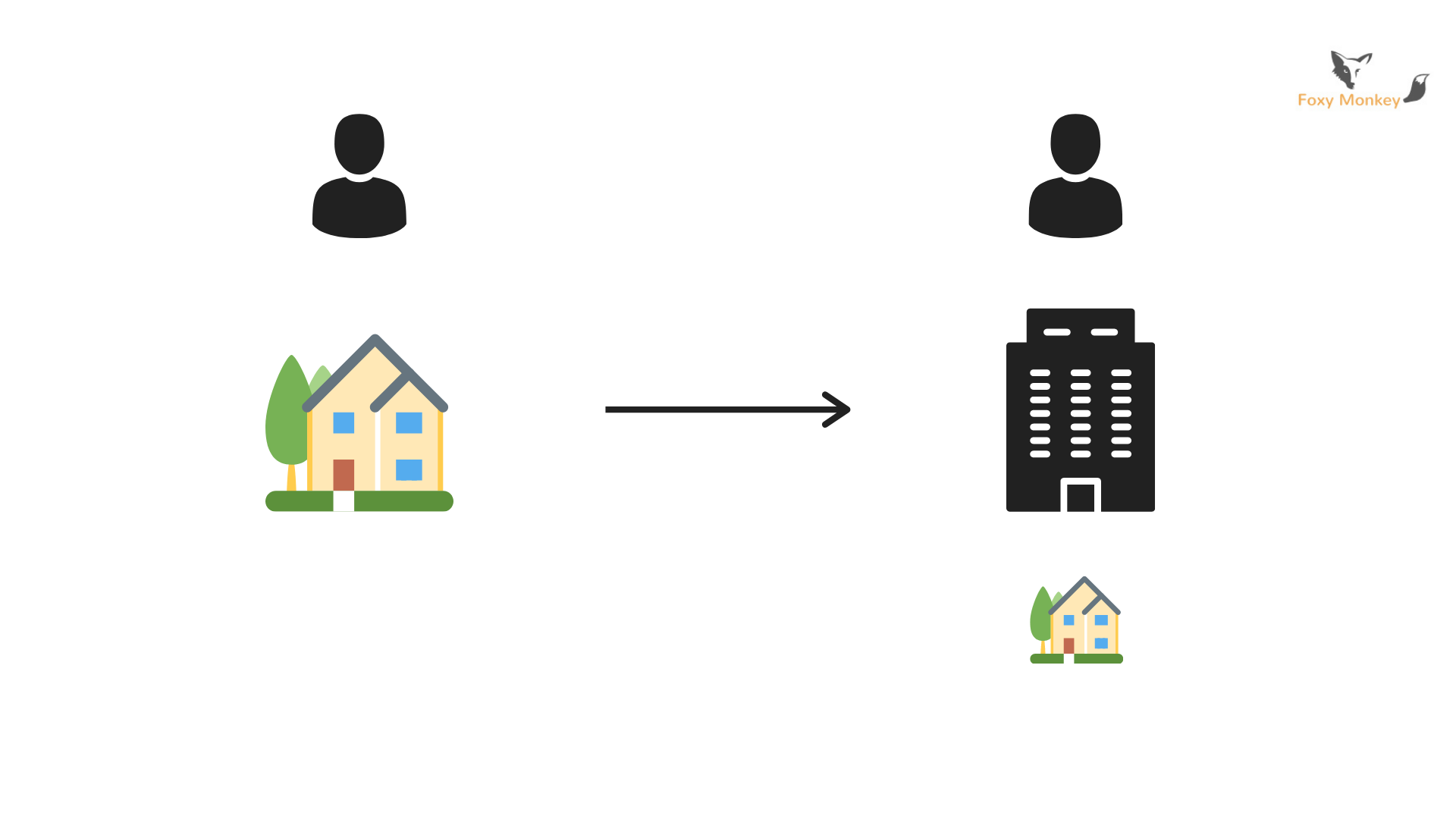Should you buy property through a limited company or in your own name?
As a UK property investor, you face this question occasionally.
People used to buy buy-to-let in their own name. With the recent tax changes, things changed. Investors have started buying property using limited companies.
One big advantage of doing so is that company Buy-to-let owners have lower taxes. They enjoy better tax planning too.
Companies can treat the mortgage interest as an expense. This is tax-deductible. Personal landlords can only claim a 20% tax relief on the interest amount, so tax is higher!
But running a company is not as straightforward. You can’t treat a corporation as if it’s your personal bank account. A company comes with extra admin and accountancy costs.
You might also pay higher interest rates on the mortgage!
So what’s better? Should you buy property through a limited company or not?
Here is what this guide covers:
Contents
Benefits of Buying Property through a Limited Company
Top reasons for buying property via a limited company:
- Pay lower tax on rental income
- Expand your portfolio faster
- Detach your personal taxes from your property portfolio
- Better family and estate planning
- Better negotiating power when selling
- Be more ‘professional’

1. Pay lower tax on rental income
Companies pay corporation tax on rental income. Individuals pay income tax, instead.
Corporation tax is currently 19%, which is lower than income tax in most cases. Income tax is 20%, 40% or 45%. This depends on your tax bracket.
As a result, buy-to-let companies pay lower taxes than most individuals.
For you to enjoy the money, you need to take it out of the company. So you are ‘double taxed’ in a way. But it can still work out better than personal ownership (see case study below).
From 2023, the corporation tax will be 25% for annual profits greater than £50,000. But even if you exceed the threshold, it would still be lower than higher rate taxpayers.
2. Expand your portfolio faster

If you plan to build a property portfolio, an LTD company might be a better way to do it.
Why? Because lower taxes mean faster compounding if you re-invest them.
You can build a property portfolio much faster and only take profits home when you need to.
3. Detach your personal taxes from your property portfolio
If you own property in your own name, any rental income or property sale is taxable in the same tax year.
This can get expensive if you already have a job or an income from other properties.
Just ask those landlords who wish they had incorporated their properties when they bought.
When investing through a limited company, you detach your personal tax affairs from your property portfolio.
The company’s profits have nothing to do with your personal tax situation.
The business pays corporation tax. You don’t have to pay any income tax, unless, well, you take an income. But leaving the funds inside the company or re-investing it is a quick way to expand.
The benefit of this approach is that you then take the income when you actually need it.
This is very useful because you can time the income you take from the company for when it’s favourable to do so. i.e. take a year off, reduce your working hours, or sell the business for a profit.
4. Better Family and Estate Planning
Do you know what’s better than a buy-to-let company? A family buy-to-let company!
Family can do work as part of your property portfolio and get paid by the company. Or they can become shareholders and receive dividends.
This way, you utilise their tax allowances too. UK taxpayers have a tax-free £12,500 personal allowance every tax year.
Be careful when paying children before the age of 18. This is considered income shifting by HMRC. It will be taxable at your marginal tax rate instead!
You can also reduce your estate tax by offering shares of the property business to your heirs. This needs careful tax planning.
But one option is to do it in an orderly way and eventually transfer the business tax-efficiently. Also, a side effect of paying them dividends is that it saves you future inheritance tax on those profits.
5. Better negotiating power when selling
Say you want to sell your personal property. The buyer will have to pay the entire stamp duty tax to buy your property. This can be very high, like 6% of the value.
But if you own property through a limited company selling becomes a lot more attractive.
This is because you would be selling your shares of the limited company, not the property directly. As a result, the buyer would need to pay only 0.5% stamp duty for your shares. This is much lower than the traditional stamp duty tax on property.
This counts as a company shares transaction, not property!
This can give you negotiating power because you save them money.
6. Be more professional
It used to be that most landlords were ‘accidental’. So a family buys a house, moves to a bigger one and keeps the small one as BTL.
The government made it clear they don’t like amateur landlords. The playing field has changed. It’s harder to succeed in the world of BTL now. Sky-high housing prices, higher taxes and more regulation come to mind.
Doing property as a hobby is harder, only the professionals will survive.
Like Finumus best put it – “It’s not 1994 anymore.”. That’s not to say BTL is dead or anything. But as your obligations increase you need to be more professional to succeed in property.
Reasons to Buy Property in your Personal Name
About half of all new buy-to-let purchases now happen through a limited company. But there are good reasons to still buy in your own name.
Here are the top reasons why you should own buy-to-let in your own name and avoid the limited company route:
- Easier than starting a company
- Personal buy-to-let ownership works better for basic rate taxpayers
- Less scrutiny
- Cheaper mortgage rates
Let’s explore them in more detail.
1. Easier than running a company
Running a property company comes with extra admin headaches. To name a few:
- Annual accounts + company tax return
- Finding an accountant
- A company bank account
- A yearly confirmation statement
Owning property in your own name is simpler. You already have a bank account and perhaps file a personal tax return too.
With property in your own name, you avoid the extra hassle both at the beginning and on an ongoing basis.

2. Better for Basic rate taxpayers
It’s true that LTD companies can save you tax. Despite all the buzz, owning buy-to-let property as a basic rate taxpayer works out better.
This is because your income is only taxed once. You pay 20% tax on rental income and 18% capital gains taxes. That’s it. You can also enjoy your annual personal allowance (£12,500) if it is not used.
As your income increases, owning property in your personal name gets less favourable. Particularly so, if you own other properties or have a high-paying job.
But basic rate taxpayers are probably better off without a property limited company.
3. Less scrutiny
As a personal landlord, your finances are scrutinized. The lender will check your property and your personal finances before giving you money.
Sometimes people think that company BTL lenders will only check the company. That’s not the case in most cases.
If you get a mortgage through a limited company, the directors will still need to personally guarantee the loan.
So your liability does not stop at the company level. You are still liable for the debt with your personal wealth. It’s a company mortgage in all but name 🙂 !
4. Cheaper Mortgage rates
Company buy-to-let mortgage rates are higher than personal ones.
So you can find a BTL mortgage at 2.5% but the company one will cost you 3% interest instead.
As more company mortgages come to market the landscape improves. Competition works in our favour.
There’s still a difference. Company mortgages are just more expensive!
As you can see, it’s not a black or white decision. Despite the government fighting private landlords, it might still work in your favour. Personal finance is just that – personal!
For higher-rate taxpayers, buying property through a limited company will most likely be the best option.
But enough words, let’s have a look at an actual example.
Case Study: Company Buy-to-let vs Personal [Higher rate taxpayer]
Let’s do a personal vs company buy-to-let comparison.
Taking the average UK house price and average rent.
House price: £278,000
Deposit (75% LTV): £70,000
Interest: £444/m (2.5% rate)
Rent: £1,100
Say 10% Maintenance.
Rent received: £1,000
Personal Investor
The Personal investor is a higher rate taxpayer so will be taxed 40% on the rent. But due to the “Section 24” tax changes, the personal investor will only be able to claim a 20% tax back on the interest.
[Monhtly] Personal Tax = £1,000*0.4 – 20%*£444 = £311
[Monhtly] Personal profit = £1000- 444 (interest) – 333 (tax) = £233 per month = £2,796 per year
So we put £70k down and earned £2,796 that year.
That’s a 4% return on our initial investment [personal buy-to-let]!
Not bad.
Let’s compare that with the company investor.
Company Investor
The company investor will be able to deduct the entire interest from their taxable profits.
£1000-444 (interest) = £556 taxable profit
[Monthly] Company Tax = 19%*(£556) = £105.64
[Monthly] Company Profit = £1,000 – £444 (interest) – £105.64 (tax) = £450 per month = £5,404 per year
So the company investor put £70k down and earned £5,404 that year.
That’s a 7.7% return on our deposit!
The company investor ended up with almost double what the personal investor got (4%).
Now you might say, NOT SO FAST!
Those profits belong to the company. If we want to take the profits home we need to pay tax.
The good thing is that the tax from company dividends is lower than the income tax from buy-to-let in your name.
Taking an income from a limited company depends on your tax rate. But dividends are taxed lower than rental income.
| Tax Band | Dividend tax (company) | Rental income tax (personal) |
|---|---|---|
| Basic rate | 8.75% | 20% |
| Higher rate | 33.75% | 40% |
| Additional rate | 39.75% | 45% |
All things considered, the company approach gives you more flexibility. You decide when you want to take the income at a time when it’s more favourable to you.
You can roll it up in the company, buy another property instead, distribute dividends to family members etc.
But even if the company investor wants all income out each year, it still works better.
Annual profit = £5,404
Total dividend tax = £2,255
Take home company= £3,148 vs Take home personal, BTL = £2,796
It gets even better if you plan on selling the property. This is because company taxes (19%) are lower than capital gains taxes (28%) for higher-rate taxpayers.
So in the above scenario, buying buy-to-let property through a limited company is better than buying it in your personal name.
The corporation tax goes up to 25% in 2023 for companies with annual profits >£250,000. Yet, property companies will still enjoy the 'small profits rate'. This keeps the Corporation tax to 19% for annual profits up to £50,000. It gets more complicated if you operate more than 1 company, as these limits get halved.
How to Buy Property through a Limited Company
To buy property buy-to-let through a limited company, you need 4 things:
- A company (SPV)
- A bank account
- An accountant
- A mortgage (optional)
SPV – The company vehicle

SPV stands for Special Purpose Vehicle. It’s a fancy name for “a company set up wholly and exclusively for investment in property”.
Lenders like to see a pure property vehicle because it removes the risks from other operations.
So if you need a company buy-to-let mortgage, then an SPV company will be needed. But registering a new company is easy. An accountant can do it in a matter of days.
Note that your SPV should have one or more of the following SIC codes:
- 68100 Buying and selling of own real estate
- 68209 Other letting and operating of own or leased real estate
A SIC code provides guidance on what the company is doing.
Funding the SPV can happen in many ways. One is a personal loan from you (director’s loan). The company can return the loan to you free of tax.
Another way is to lend money from other companies or by implementing a group structure. There are different pros and cons to these tax structures. The Company investing course covers them in detail.
Bank account
You would need a company bank account too. You can either use a high street bank or a challenger bank like Starling.
But make sure it is FSCS-protected. This means the government will protect your funds (up to £85,000) if the bank goes bust.
Mortgage
Buying a buy-to-let property in cash is easy. You don’t need to convince anyone to give you money.
To get a company buy-to-let mortgage you need to be aware of a few things.
We said already that lenders like to see companies that only do property investing.
Another rule is that the loan is at least 75% Loan-to-value. This means that if you’re buying a £100,000 property, you need to put at least a £25,000 deposit.
Moreover, they perform a rental assessment to make sure you can afford the mortgage. This is in the region of 125% of the interest payment.
If it’s a new SPV it will not have any history of its own. Therefore, a credit score and a personal guarantee from the director will be needed.
When it comes to mortgages, having a good mortgage broker is key to getting the best option.
Is it Better to buy Property Buy to Let through a Limited Company?
As a basic rate taxpayer, you are better off buying property in your own name.
If you reach the £50k higher rate threshold, you can buy future properties through LTD Companies.
Buying buy-to-let through a limited company makes sense if you:
- make more than £50,000 a year
- you don’t need the rental income to live on
- you plan on building a BTL portfolio
You can reinvest the buy-to-let earnings and use them for future company purchases.
Then detaching your personal tax situation is powerful too. Taking an income from your company’s property portfolio can happen anytime. That’s once your other income drops or you built your desired property portfolio.
For example, you might take a sabbatical from work, quit work earlier, use it as a bridge to your pension, pay family etc.
I like this rule for higher-rate taxpayers.
Keep existing properties in personal ownership. Buy future properties via a limited company.
Of course, buying property through a limited company is not the ONLY way to invest in property. See my other posts on UK REITs (passive property ownership) and Property Partner.
Whatever you do, make sure you take some professional advice. Property investment involves big sums. It is also expensive to make changes after buying!
Happy property hunting :)
Do you do property buy-to-let through a limited company or personally? Let me know in the comments!
————————————–
FAQ
Many landlords owning properties in their own name wish they had bought them via LTD companies. Can you not transfer the property now?
When you transfer residential property to a Limited company you own you will have to pay the following:
1. Stamp duty tax
2. Early redemption fees (if mortgaged)
3. Capital gain tax
4. Solicitor and mortgage broker costs
This is because even though the asset does not change hands, in legal terms it actually does! You and your limited company are different entities. It is as if you sell your house to your company.
This article explains whether you should transfer your property to your limited company.
There might be a chance you qualify for “Incorporation Relief”. This allows you to get tax relief on transferring the asset to your limited company.
To qualify for Incorporation Relief one of the main requirements is to run your property portfolio as your main business (spend at least 20 hours a week on it!).
Yes, buying residential property through a limited company triggers stamp duty tax (SDLT).
The standard rates of stamp duty tax apply. On top of that, investors have to pay an extra 3% stamp duty tax. This includes both companies and individual landlords owning other properties already.
Good to know: Companies and partnerships have to pay another tax called the Annual Tax on Enveloped Dwellings. This applies only for property values > 500k. The tax rate works out at about 0.5% of the value (exact rates here).
Yes, but you will have to pay a benefit in kind tax. That’s because your company provides you with living accommodation, a personal benefit.
If you pay market rent to your company, none of these applies.
But in this case, your company would have to pay corporation tax on the rent. Also, it means that if you want to take your rent back from your company, you need to take it as income. As a result, you’ll have to pay income tax depending on your tax bracket.
There is another point to consider if you have a mortgage. Check with your lender, if your buy-to-let mortgage allows you to live in your property!
Rental income is not subject to National Insurance. This means private landlords do not have to pay NIC on their rental profits.
Be careful if this is your only income. You may miss out on the State Pension despite having paid a lot of income tax. A State pension requires national insurance contributions!









6 thoughts on “Buying Property through a Limited Company – Pros & Cons”
Great article, well written and insightful!
Harry Adjei
Thank you, Harry.
Very informative, thank you
Thanks for reading, Sami!
Thank you for this beautiful and insightful piece
hey, glad you liked it